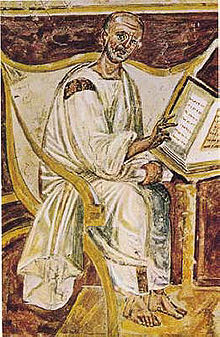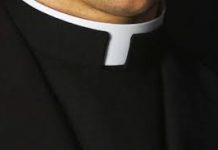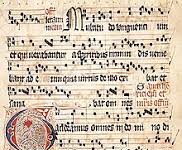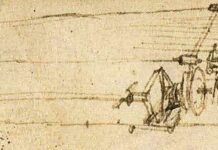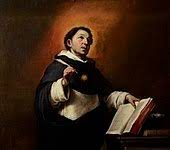A blessed feast of the great Saint Augustine (354-430), bishop and doctor of the Church, and one of the greatest theologians in her history. His voluminous works – his autobiography, sermons, commentaries, letters, – helped form the mind and soul of Christian civilization.
Augustine himself was nearly not the Augustine we know. In the mystery of God’s providence, much depends on our free decisions, he was moved by His grace – things need not have been the way they turned out, with the present and the future really are up to us to shape as we might.
He was born on November 13th, 354 in in Tagaste, in what is now northern Africa, 60 miles or so from Hippo, where he would later be bishop, (back then, all part of the Roman Empire), Augustine’s mother, Monica, as we saw yesterday, was Catholic, and his father, Patricius, a pagan. The soul of Augustine was to be sorely tried in discerning which path to be the true one.
After receiving a Christian education, as far as his mother could provide, which implanted the seeds of his future conversion, at the age of nineteen he went off to ‘Carthage’, synonymous back then with ‘hedonism’, much like our modern universities. Augustine was idle, and fell into the sins of a young adulthood without the safeguard of chastity, taking up with a woman, and bearing a son, whom he named Adeodatus, one ‘given by God’.
But Augustine, of a strong philosophical bent, could not rest easy with the premise that pleasure was all there was to life, for his mind realized that any joy was transient, and the one question that drove him (as it should drive us) is the nature of evil, and whence it comes. As he soon discovered, even our pleasures are mixed with sorrow and pain, passing so quickly, and we all go the way of all flesh, to old age, sickness, death, to say nothing of the moral evils that plagued Rome of the 5th century as they do every era: war, rape, pillage, murder, suicide, cruelty, abandonment, selfishness, pride.
Augustine in 373 fell into the simplistic trap of the Manichees, dualists who answered the question of evil by claiming there were two ‘gods’, one ‘spiritual’ and good, the other ‘material’ and evil, in constant war. This intrigued Augustine’s mind for a time, but he found their philosophy unsatisfying: Are we therefore bound to do evil? What of free-will and grace? Is everything determined beforehand? Who wins in the end?
He was also troubled by their incapacity to deal with scientific questions; their thought stagnant. If everything were pre-determined by these good and evil gods, why bother investigating anything? It is all either capricious chaos, or fatalistic.
And, finally, the immorality of their life was scandalous, with little or no restraint on their sexual impulses. After all, if the body is ‘evil’, and not really under our control, then why not have at it, and let it go its own way? Augustine’s own body ‘went its way’, and he continued his sexual liaisons, albeit always with some regret. He prayed for continence, but, as he added, ‘not yet…’
Augustine struggled with these questions, continuing to teach, at which he was remarkably successful, not surprising given his quick and wide-reaching-ever-searching mind.
His mother Monica, at first rejecting her son because of his heresy, cast him from her table, but then followed him to Rome, then to Milan, where Augustine went in search of greater and more lucrative posts, and seeking something, just not quite knowing what.
All the while, Monica wept and prayed for her son (recounted in some of the finest passages of Saint Augustine’s Confessions), and Saint Ambrose, who would later receive Augustine into the Catholic Church, consoled her that ‘the child of those tears shall never perish’.
Sure enough, after 17 years of resistance, it was at Milan that Augustine, at the providential age of 33, yielded to the grace of God, accepting the full truth of Catholicism, in his mind, as well as now his heart and body, putting away his concubine, and accepting, from that day forward, a life of penance, conversion and prayer, all founded and motivated by the love of God that he had found. Sero te amavi, pulchritudo tam aniqua et tam nova, sero te amavi! Late have I loved Thee, o Beauty ever ancient and ever new, late have I loved Thee! He had finally found what He had been searching for all along, the God as revealed in Christ, through the Catholic Church, the beauty of whom shone through, even if obscured by the sin of this world.
The rest of the story is Augustine’s Catholic life is one of growing in sanctity, exercising his gifts and talents for the Church, for his people, for the glory of God. He was baptized by Ambrose, the bishop of Milan, in Easter of 387, then retreated to a quasi-monastic house that he founded and for which he wrote a rule of life (which was adopted by a number of future religious orders); praying, writing and reading incessantly. Only later did he accept ordination under some degree of coercion, in fact avoiding places where an election to the priesthood might take place. While praying in a church in Hippo, the people surrounded him and pleaded with the gifted man to become their priest, to which he relented.
Augustine tasks increased when he was elected bishop of Hippo in 396, at the age of 42, overseeing the diocese for the next 34 years until his death in 430, just as the Vandal hordes were at the gates.
The topics on which he wrote and preached covered the whole of what was then known: From philosophical speculations on the nature of time, music, education, eternity and evil; to theologically and spiritually profound sermons, to commentaries on Scripture; and all this, while dealing with administrative issues, solving problems, settling disputes, fighting heresies and schisms, not least the Pelagians, Donatists and Arians.
He worked to the very end, and after a three month illness, as the world around him collapsed under the invasion of the Vandal hordes, Augustine went to his eternal reward on this day in 430, leaving a spiritual and intellectual legacy that will be unpacked until the end of all things, it seems. Reading his works carefully would be the work of more than a lifetime.
He is an intercessor and model for all of us, not least our bishops and shepherds. Imbibing even a smidgen of Saint Augustine’s spirit would do a whole lot more good than any sort of new raft of policies and procedures.
Saint Augustine, ora pro eos et pro nobis!

